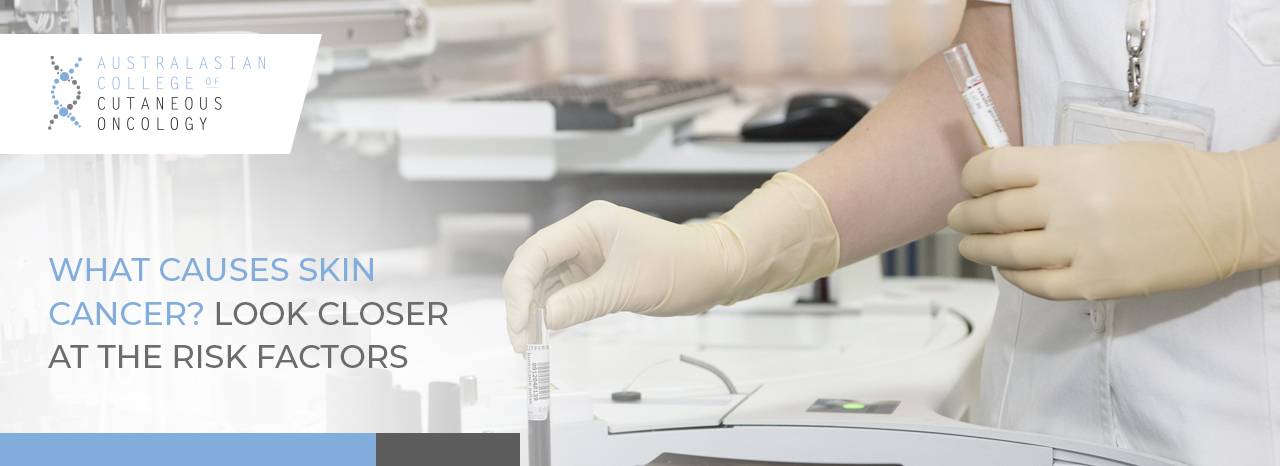The question of ‘What causes skin cancer?’ is frequently asked by people on internet. Here we summarize some information to provide you a knowledge about skin cancer risk factors.
According to the World Cancer Research Fund (WCRF), skin cancer (melanoma) of the skin is the 19th most common cancer worldwide. In Australia melanoma is the second commonest invasive cancer of women after breast cancer. It is the second commonest invasive cancer of men following prostate cancer.
Melanoma is now more common than either lung cancer or bowel cancer in Australia.
What causes skin cancer?
Skin cancer develops when skin cells are altered and start reproducing abnormally. As they grow and divide without stopping, they can metastasize. This means they spread to other places in your body through your lymphatic or circulatory systems.
Ultraviolet (UV) rays from the sun or tanning beds cause basal cell skin cancer. UV rays can damage the DNA inside your skin cells, causing the unusual cell growth. The cause of Squamous cell skin cancer is mostly by UV exposure, mainly the sun. Squamous cell skin cancer can also develop after long-term exposure to cancer-causing chemicals. It can develop within a burn scar or ulcer, and may also be caused by some types of human papillomavirus (HPV).
The cause of melanoma remains unclear. The sun has a major role. But there are other unexplained factors. Most moles don’t turn into melanomas. Researchers aren’t sure why some do. Like basal and squamous cell skin cancers, melanoma can be caused by UV rays. However, melanomas can develop in parts of your body that are not typically exposed to sunlight.
Risk factors of skin cancer
There are some factors that may increase you risk of skin cancer, include:
Excessive sun exposure
Excess sun exposure from spending a lot of time in the sun can develop skin cancer, especially if the skin is not protected by shade, hats, clothing or sunscreen. Tanning, including exposure to tanning lamps and beds, also puts you at risk. A tan is an injury response to excessive UV radiation.
Fair skin
Skin cancer can affect everyone, regardless their skin color. Pigment (melanin) can help to protect your skin from damaging UV radiation. People with fair skin (which means they have less pigment) have less protection against damaging UV radiation.
A history of sunburn
Having had one or more blistering sunburns as a child, teenager or adult increases your risk of developing skin cancer as an adult. One sunburn doubles your life risk of melanoma.
Moles
People who have many moles or abnormal moles (dysplastic nevi) are at increased risk of skin cancer. Abnormal moles usually look irregular and are generally larger than a milder moles. Abnormal moles are more likely to become cancerous. If you have a history of abnormal moles, watch them regularly for changes.
Precancerous skin lesions
The risk of skin cancer may increase for people who have skin lesions known as actinic keratosis. These precancerous skin growths typically appear as rough, scaly patches that range in color from brown to dark pink. The sun causes actinic keratoses. The most common place for these precancerous growths is on the head, face and hands of fair-skinned people.
A family history of skin cancer
If one of your family has had skin cancer, you may have an increased risk of getting skin cancer. However, one thing that needs to be highlighted is skin cancer is not contagious.
Sunny or high-altitude climates
People who live in sunny warm climates are exposed to more sunlight than are people who live in colder climates. They are exposed to more UV radiation.
A weakened immune system
Immune systems have a crucial role to keep us healthy. People with weakened immune systems (such as people living with HIV/AIDS and those taking immunosuppressant drugs after an organ transplant) have a greater risk of developing skin cancer.
A personal history of skin cancer
2/3rds of people who develop a skin cancer go on to grow a second skin cancer. If you have had two skin cancers the risk of a third is over 90%.
Exposure to certain substances
Disclosure to certain substances, such as arsenic, may increase your risk of skin cancer.
Radiation Risk
People who received radiation treatment for skin conditions (such as eczema and acne) may have an increased risk of skin cancer.
Early detection is the best way to ensure successful treatment of skin cancer before the disease develops further. Unlike other organs, your skin is highly visible at all times. That means you can proactively watch and monitoring for signs of changes, unusual spots, or worsening symptoms. If you need an expert consultancy, click here.
Learn more about skin cancer with ACCO (Australasian College of Cutaneous Oncology). ACCO provides practical and theory-based training and education to improve and also certify competency in the management of skin cancer. Our policy is that no pharmaceutical company shall be permitted to sponsor or endorse any event, function or workshop in any manner. This creates a truly unique and unbiased learning environment

